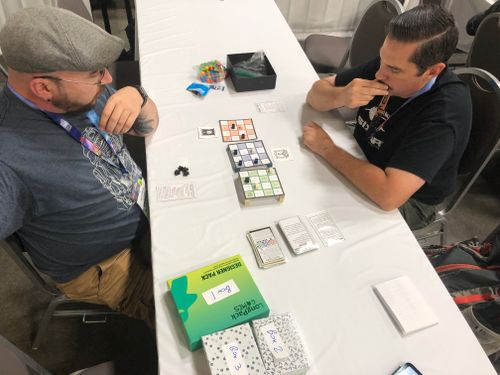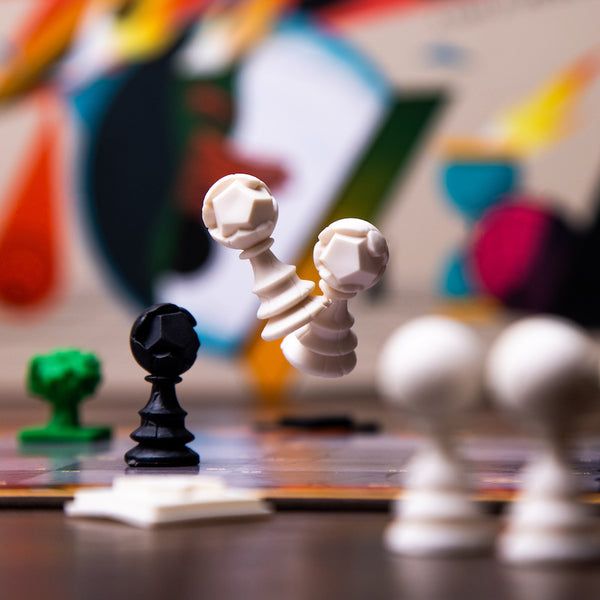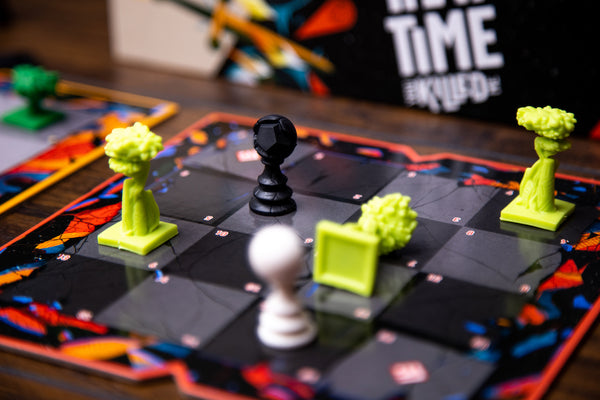Share

It's late 2018. You have a deadline, so you're cleaning your office. (It's excellent procrastination.)
While you clean, you have a video in the background: someone attempting to play 4D Chess. It looks awful. The game, not the video. The video is excellent. The game looks terrible.
But does it have to be?
Ten minutes later, you're sketching ideas into your iPad. (You're a truly great procrastinator.) You sketch three boards in a line: past, present, future. Time machines dotted around, letting you shift between the eras. Paradoxes: Whenever you stand adjacent to a copy of yourself, both copies are destroyed.

And different objects show up in each era: [REDACTED] in the past, [REDACTED] in the present, and [REDACTED] in the future. Each of them interacts with the timeline — and each other — in different ways. You may have actually managed to create something more convoluted than 4D chess.
You play it against yourself for a while, refining and simplifying; instead of tracking which era each copy of yourself originated from, each player just has one type of token. You remove the time machines from the board; now your tokens can just time travel as an action. And as cool as it was conceptually, you no longer require a trained [REDACTED] to push a [REDACTED].
Because the game is a true abstract — perfect information, no randomness — it's easy to play against yourself. More than just easy: fun, addictive...even after you meet your deadline and are no longer seeking procrastination.
Maybe you've got something here?
That week, you bring it to your playtest group. For reasons that you will never be able to explain (even if someday in the far future, you write a designer diary promoting the release of the game) you decide not to put any words on your reference cards.

Five different objects, each with unique interactions and all represented by icons. It's a disaster.
Your playtester (Marek Tupy) is very kind. "There're some fun ideas in here", he says. "Underneath the unhinged level of complexity", he doesn't say.
As is typical for you at the time, you thank him for his feedback and later convince yourself that he's wrong. The game is simple; you've played it against yourself dozens of times now. The reference card is the problem. Once you clean that up, the game will be done. Ready to go. No more development needed.
It's never happened before, but maybe this will be the first of your games to be completed within weeks, instead of a year.
It takes several more overwhelmed playtesters before you start to consider Marek's unspoken words. Expecting people to understand interlocking rules of three sets of time-traveling objects is too much — even if the [REDACTED] are super cute.
You reduce the number of sets to two, then one, and...it works. People are able to understand the game. More than just understand: play, enjoy, strategize. Some playtesters email you afterwards, asking whether they can play it more. One will continue to ask about it every time she sees you for the next three years.
These are good signs.
You even try cutting out the bonus pieces entirely and run some games using just the basic time-travel mechanism. No bueno. It's a fine enough tutorial mode, but it's not quite engaging enough, and it often ends in a stalemate. You happily add one set of objects back in.

The game works, but you're not satisfied. Cutting it down has made it accessible to newcomers, but you worry that it's lost its replayability. Plus, the more you work on it, the more content you come up with. An entire set of [REDACTED], different for each of the special pieces. Several different kinds of [REDACTED], for increased replayability. And, yes, you even come up with a way to include video-game-inspired [REDACTED].
You show it to Stevo Torres at GAMA Trade Show 2019. For some people (like you) this game scratches a weird itch, and you can't get enough of it. Stevo is one of these people. You end up hanging out enough that he masters the base ruleset and dives into the other content.
"These are all fun", he tells you. This is the same convention that he shows you his game Brew, which will eventually be a 2021 Pandasaurus Games release as well. "Your system is really robust. It's like a sandbox game."
His words, so casually delivered, make everything click. Sandbox game. You could release the game with a set of modules. But you don't want people to open the box and be overwhelmed; you'll have to guide them through it.
With a campaign.
An abstract game with a campaign. Now that's something new.

You have your own board game company, but this game isn't right for it. Your BFF, Nicole Cutler, has just started working at Pandasaurus, so you reach out to your friend Jon Gilmour, their scout. He's going to be at the Unpub convention, taking game pitches; he's all booked up, but he says that if you catch him not playing a game, he'll check it out.
You manage to catch him at midnight. You show him the basic gameplay. He says it's clever...but unremarkable. There are dozens of clever abstract prototypes out there; why should Pandasaurus make this one?
You explain the marketing hook: an abstract game with a campaign. A time-travel plot, about two rivals competing to prove that they invented the time machine. "Okay", he says patiently, "so show me that."
When you're not making board games, you're a writer. You go home and put together the start of a campaign. A funny letter introducing the concept. A plot that unfolds over multiple games, slowly introducing new mechanical concepts. You even go to a stationery store to get fancy envelopes for your [REDACTED].
It's June 2019. As has always been the case, as will always be the case, it's taken you several months to get everything smooth and working and finally nail down what the game is. You have a cute working title: "Legacy: A Time-Travel Game OR Time Travel: A Legacy Game". The "OR" is part of the title, as with Dr. Strangelove. No one finds this as amusing as you do.

At Origins Game Fair, you cold-playtest your game a dozen times, watching people open the envelopes and unlock the new content. Despite the working title, it's not really a legacy game; it's a campaign. You can finish it, reset the entire thing, and start again. On the third day of the convention, you show it to Jon again. He immediately has Molly and Nathan, the co-owners of Pandasaurus, play it. They take a copy of the prototype home with them.
By August, the game is signed.
Because everyone knows everyone in board games, two of your best friends are hired to develop it. You finish writing the campaign, and Jeff Fraser (your Cartouche co-designer) plays through it with his wife. He's a professional (and Canadian), so he's very diplomatic when he tells you: The campaign stinks.
It's 15 missions long. Several of them require you to play multiple games in a row. While designing it, you played hundreds of games against yourself; you've gotten so fast at playing your own game, it takes you less than five minutes per game.
When two other people are playing it against each other, actually considering their moves and trying to win (as opposed to just making sure the [REDACTED] aren't hugely unbalanced), a game can take half an hour.
Let's do the math: 30 minutes x 15 missions x 2-3 games on average = Jeff and his wife spent one million years playing through the campaign.
He suggests cutting it down to three chapters and making each of them more significant. You reluctantly agree that maybe one million years is too lengthy — and that's before you even get into all the [REDACTED].

Alex Cutler is the other dev. You're also co-designing a game with him (Providence). He and Jeff get to work, stripping the game down to the best parts and turning your meandering sequence of games into a tight set of three modules, plus the [REDACTED].
You're mostly cut out of the process at this point (so that they can trim stuff without being distracted by the sound of you crying in the corner), but when they're done, they show you what they've done. [REDACTED] and [REDACTED] have stayed mostly the same, but [REDACTED] has been completely rewritten.
To, you're forced to admit, a far better system — even if it does mean you lose the incredibly cute [REDACTED] mechanism.
At least you got to keep the little hats.
You get to work rewriting the story to match the new game and helping playtest all the updated [REDACTED]. You manage to convince them to put [REDACTED] back in the game; they're not part of the main campaign, but you really loved it when Plants vs. Zombies did something similar. (Plus, you had a bunch of jokes written for it.)
To your delight, Stevo (who now works with Pandasaurus full time) is doing the graphic design. You're completely unsurprised when he knocks it out of the park, making the art of Jor Ros pop. Danni Loe starts marketing the game, sending out infinity review copies.

Tweets start coming in; people are enjoying the game, the writing, the little flourishes. Someone describes it as "the most thematic abstract game" they've ever played. Someone else says it's the most time-travelly game they've played.
You should be happy. Everything is going exactly as you hoped it would. Better than you could've imagined — but something is bothering you.
You poured everything you had into this game. You've now played it thousands of times. On more than one occasion, this was the project with deadlines that you wanted to procrastinate from. You even pulled an all-nighter at one point because you wanted to make sure that the [REDACTED] had full [REDACTED] on every card.
But you're not happy. You see, despite putting all this time and effort into the game...you've never travelled through time.
When you made your pirate card game, you did your research, robbing a merchant vessel and spending several years in prison. When you created a game about a tiger and a lady, you sought out real-life women and real-life tigers to understand their experiences. And yes, when you made your game about French toast, you ate a helluva lot of French toast.
So why are you making a game about time travel without having experienced it personally?

There's only one way to remedy this: You spend the next year reading about relativity, time dilation, cross-dimensional algebra, and pumpkin spice. You're so focused, you miss Christmas 2021. You miss New Year's Eve. You miss Easter. You barely notice the iPhone uprising of 2022, the Harris/Pence wedding, or the new Super Mario movie winning every single Oscar.
By the end of 2025 (or "Year 3 of the iPhone Dynasty", as it's now known), you've done it. You're about to be the first person to travel through time.
There's every chance you won't make it back. If your game has taught you nothing else, it's how intricate (and fun!) time travel can be. You might accidentally wipe yourself from history...or worse, erase the game you spent so long on.
You reach out to your most handsome friend, Peter C. Hayward. You show him how your time machine works. You tell him that if you don't come back, he has to stop you from building it. It's the only way to make sure that you survive and that your game comes into existence.
He agrees — he's a very lovely chap — but you see a gleam in his eye. Your game is all about someone stealing credit for the other player's invention. But...Peter wouldn't do that, would he? He's always been such a kind, handsome friend.
Did I mention handsome?

As a failsafe, you write yourself a letter, a long letter detailing how you came up with That Time You Killed Me. You hack into Peter's BoardGameGeek account (to make sure you'll definitely see it) and set it to post the week before you started work on your time machine.
Fortunately, no one will ever need to see this letter. Peter can definitely be trusted. Besides, you're pretty sure you've gotten the time-travel technology right.
As soon as you get back from your jaunt through time, you'll just cancel the post. The only way that this will go public is if Peter goes back in time, steals your game, and claims it as his own. And there's no way he'd do that.
He's far too handsome.


